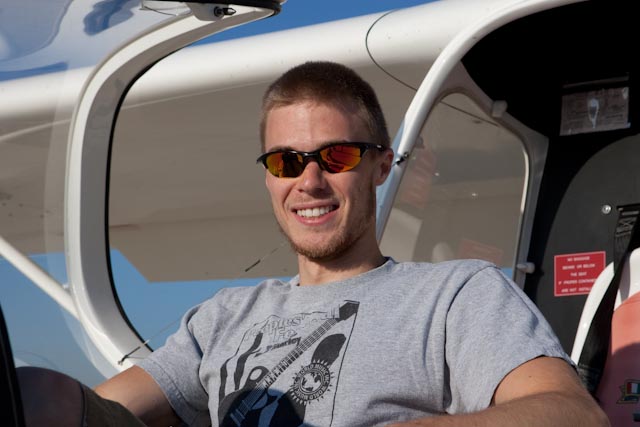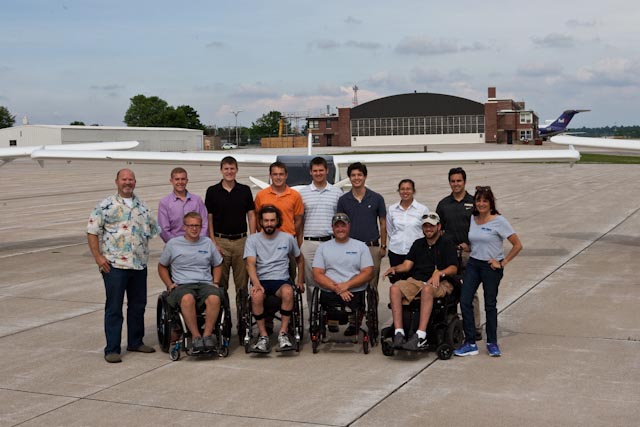BTN.com staff, June 25, 2015
Just a few years ago, Wes Major didn?t know he could fly. The Wilmington, Del., native lost the use of his legs in a motorcycle accident at the age of 20, and his dream of learning how to pilot an aircraft seemed like something that would be forever out of reach.
But after hearing about the Able Flight program at Purdue University, which helps people with physical disabilities learn how to fly, Major drove his adapted car more than 700 miles from his home to the school?s campus in West Lafayette, Ind., in the summer of 2012.
 ?I didn?t fly before my accident, but there was an interest,? he said. ?And once the accident happened, I didn?t think about it until I came across Able Flight. My mentor from rehab in Philadelphia told me about it.?
?I didn?t fly before my accident, but there was an interest,? he said. ?And once the accident happened, I didn?t think about it until I came across Able Flight. My mentor from rehab in Philadelphia told me about it.?
After successfully completing the six-week Able Flight program that summer, he realized he wanted to continue his education in that field at Purdue. Today, Major is a graduate student studying aviation technology at the university and serves as assistant director of Able Flight. He?s also a licensed pilot who feels like he could spend the rest of his career in aviation.
?The main point of Able Flight is not getting a pilot?s license,? Major said. ?That?s a sub-goal. It?s to boost self-confidence and self-reliance in people with disabilities.?
And Major has no shortage of confidence. He?s got big dreams for what he?d like to do after finishing graduate school.
?I would like to work for one of the major [airlines] - United, Delta, Southwest - doing something with management or operations around airplanes,? Major said of his career goals. ?I love being around planes.?
Bernard Wulle, an assistant professor in Purdue?s Department of Aviation Technology, considers Major a good example of what Able Flight has intended to accomplish since the non-profit program began nearly nine years ago.
?He lost the use of his lower body, but he doesn?t let anything stop him,? Wulle said.
According to Wulle, Major is among the 27 students with disabilities who have gone through Able Flight and earned their pilot?s licenses after accepting scholarship offers. Students are required to possess a valid driver?s license and have flown alongside a certified flight instructor (CFI) before participating in the program.
?The CFI shows you some basic moves to make sure you are not going to hyperventilate or have a panic attack,? Major explained.
However, students in Able Flight aren?t treated any differently than able-bodied ones once they enter the training program, Wulle said.
?These folks can do whatever anyone else does,? Wulle said. ?They have the same hopes and dreams, and what we need to do is provide a way for them to get there.?
The program has seen a number of its graduates go on to careers in aviation. Among Able Flight?s alumni - whose disabilities range from lost limbs to hearing impairment - are a flight dispatcher, airline mechanic and Federal Aviation Administration (FAA) decision-maker working in the area of commercial space travel.
?What we want is people with unique skills for careers in aviation,? Wulle said. ?Some people see them with disabilities, but we don?t find that. We find them with unique abilities.?
[btn-post-package]Funding from multiple aviation-industry donors and support from Purdue University has kept Able Flight ?in the air? over the years. And just this month June, the Ricci Family Foundation - a nonprofit group spearheaded by aviation entrepreneur Kenn Ricci - made donations and commitments of more than $300,000, according to Wulle.
That contribution, he said, includes $150,000 over five years and a Sky Arrow L600 sport plane that is capable of being flown with hand controls only. The new funding, Wulle added, is expected to help Able Flight expand in the near future from a summer-long to a year-round program that can help graduates better position themselves as job candidates in the aviation industry.
?It?s a total win-win for the student and the corporation that picks them up,? Wulle said.
By Tony Moton







